 Petzlover
Petzlover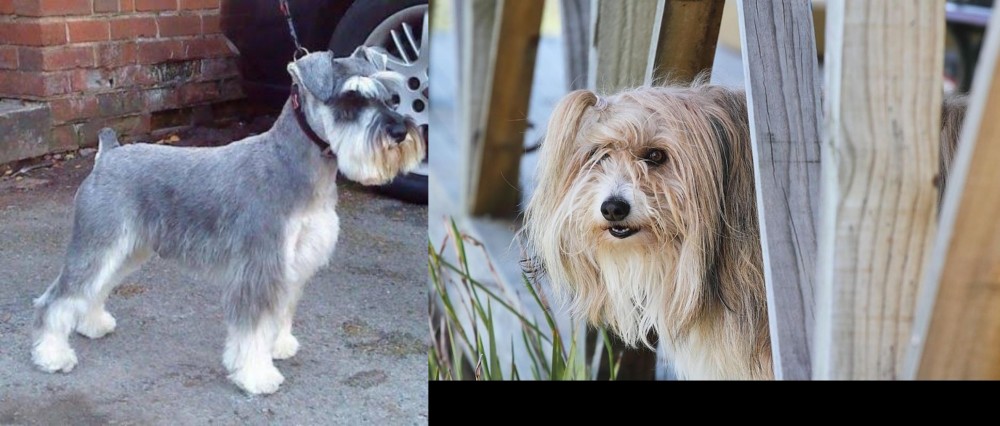 Miniature Schnauzer is originated from Germany but Smithfield is originated from United Kingdom. Miniature Schnauzer may grow 17 cm / 6 inches shorter than Smithfield. Miniature Schnauzer may weigh 15 kg / 33 pounds lesser than Smithfield. Both Miniature Schnauzer and Smithfield has almost same life span. Both Miniature Schnauzer and Smithfield has same litter size. Both Miniature Schnauzer and Smithfield requires Moderate Maintenance.
Miniature Schnauzer is originated from Germany but Smithfield is originated from United Kingdom. Miniature Schnauzer may grow 17 cm / 6 inches shorter than Smithfield. Miniature Schnauzer may weigh 15 kg / 33 pounds lesser than Smithfield. Both Miniature Schnauzer and Smithfield has almost same life span. Both Miniature Schnauzer and Smithfield has same litter size. Both Miniature Schnauzer and Smithfield requires Moderate Maintenance.
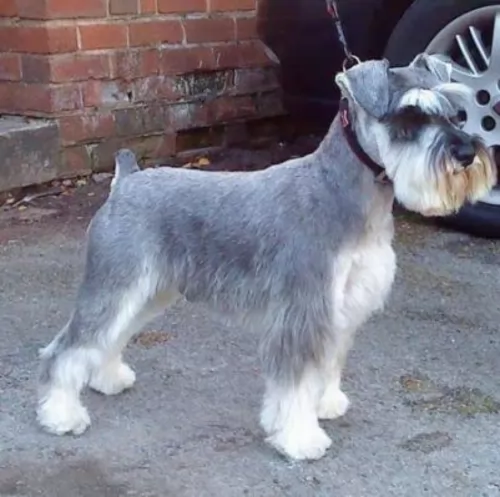 Miniature Schnauzers were first bred in Germany in the 19th century being bred from Affenpinschers and Standard Schnauzers.
Miniature Schnauzers were first bred in Germany in the 19th century being bred from Affenpinschers and Standard Schnauzers.
This dog was always used to control rats on farms, but these days he is more a companion. It is believed that the start of the modern Miniature Schnauzer in the United States was around 1924 when dogs were imported from Germany.
It was in 1933 that the Miniature Schnauzer was recognized by the AKC as a separate breed from the Standard Schnauzer.
 The Smithfield is also known as the Smithfield, Smithy or Tasmanian Smithfield and is a herding dog found in Australia but originating in the UK. There is also the possibility that there was an Australian dog bred at a place known as Smithfield, near Texas which is just inside the Queensland border.
The Smithfield is also known as the Smithfield, Smithy or Tasmanian Smithfield and is a herding dog found in Australia but originating in the UK. There is also the possibility that there was an Australian dog bred at a place known as Smithfield, near Texas which is just inside the Queensland border.
It is thought by some that the Smithfield is extinct. The dog was first introduced to the Land Down Under in colonial times.
The Smithfield isn’t recognised by the Canine Councils, but in 1862 the first Dog Show was held in Australia.
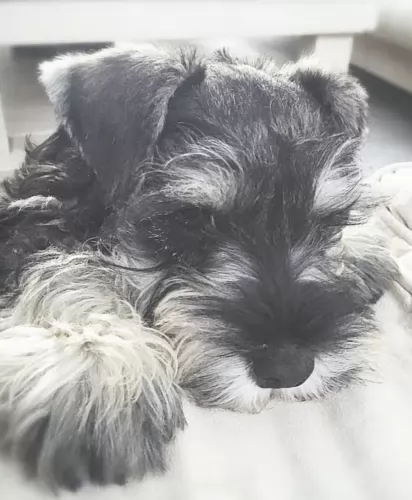 The Miniature Schnauzer is a small dog breed that stands between 30 to 36cm in height and weighs between 5 and 10kg.
The Miniature Schnauzer is a small dog breed that stands between 30 to 36cm in height and weighs between 5 and 10kg.
He has a sturdy body with a dense, wiry coat which most people prefer to have stripped. Because stripping is quite tedious, many of these dog owners prefer to have the coat clipped which actually gives the coat a greyish look to it.
The coat is usually a mix of black and silver. Some people refer to the Miniature Schnauzer as having a salt-and-pepper coat – hairs that are a mix of black and white. The dog has a double coat with the outer coat being wiry and the undercoat being a lot softer.
This is a dog that will need to be groomed frequently to prevent matting. A noticeable feature with these dogs is the rectangular shaped head with alert slanted eyes and bushy eyebrows, mustache and beard. In fact the word ‘Schnauzer’ means beard or muzzle.
The ears have been traditionally cropped but these days they are left and then they tend to be half-erect, half-floppy.
This is a tough little dog, fearless, cheeky, arrogant, alert and also friendly. A draw-card with him is that he is considered as a low-shedder and being hypoallergenic.
They’re very intelligent dogs too and will learn quickly when you give him training and socialization. This is important for a dog like this as he can quickly show you that he is strong willed and independent. Training and socialization makes him much nicer as he becomes more balanced and obedient.
He is full of life and extroverted and you can count on him to join you wherever you are and whatever you’re doing. Whether watching TV, swimming or hiking, he’ll be there and turn every occasion into a festive event. He is a loving, loyal dog, making a splendid pet.
He's protective of his human family and tends to be suspicious of strangers, and this is what makes him such a great watchdog.
 The Smithfield is a medium to large sized dog, strong and square-bodied with a wedge shaped head. Many people liken his looks to a Bearded Collie.
The Smithfield is a medium to large sized dog, strong and square-bodied with a wedge shaped head. Many people liken his looks to a Bearded Collie.
He has a rough, medium length coat. The coat has different colors such as white, black, grey or reddish brown. The coat is shaggy and in fact they are often clipped to give them a groomed look and to prevent grass and burrs clinging to the coat.
The tail of the dog can either be a natural bobtail or it could have a longer tail. When the tail is long it is carried low with an upward turn at the tip. The ears are mostly floppy and held close to the head.
He stands at between 46 to 53cm in height and weighs between 16 and 25kg. A bright, alert expression is a distinctive feature of the Smithfield.
The Smithfield is an active, robust dog and they have well balanced, stable personalities. They are often described as being laid-back.
You won’t find any signs of shyness or aggression with these dogs and they are known to be gentle and calm. They are self confident and well adjusted and also hard working.
They are devoted and loving to their human family and are also intelligent. When they’ve been trained and socialized they make splendid family pets, wonderful with children, just loving to run and play. These are dogs you can rely on to be consistent in nature.
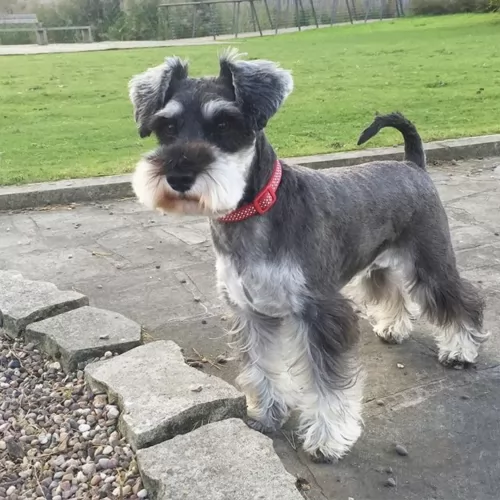 Miniature Schnauzers are such adaptable little dogs, quite happy to make a home with you in the city or in the countryside.
Miniature Schnauzers are such adaptable little dogs, quite happy to make a home with you in the city or in the countryside.
They’re sociable dogs, so just being with his human family wherever they are will suit him well. If he lives in the city however, he will need to have a walk everyday or taken to the park for a run.
He is also a dog that scarcely sheds, so he suits people battling with allergies. With an average life expectancy of 12 to 14 years, if you nurture your Mini Schnauzer and give him the best food and exercise there is, as well as loving him, you’re going to have a loyal and devoted pet.
 Those who have owned a Smithfield love them and say that once you’ve owned one, you’ll want another.
Those who have owned a Smithfield love them and say that once you’ve owned one, you’ll want another.
These easy going dogs have all the characteristics necessary to ensure a good pet, playmate and companion. They are devoted to their human family, and given the chance will become a very special 4-legged member of any family who appreciates the friendship a such a dog offers.
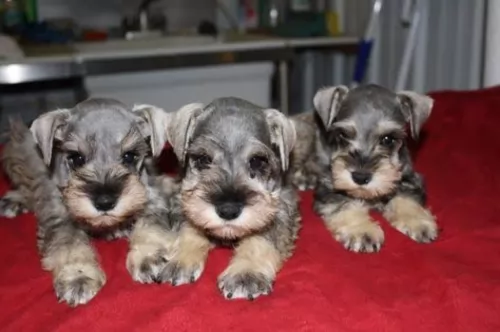 Your Miniature Schnauzer is pretty healthy and he isn’t likely to cost you much in terms of vet fees. There are however some common dog problems that you want to be aware of such as cataracts of the eye and hypothyroidism.
Your Miniature Schnauzer is pretty healthy and he isn’t likely to cost you much in terms of vet fees. There are however some common dog problems that you want to be aware of such as cataracts of the eye and hypothyroidism.
This a a problem in the lens of the eye. The lens should be clear, and when a dog has a cataract, it obscures the vision. The size of the cataract can lead to blindness.
Diabetes in a dog can bring on cataracts as can genetics or damage to the eye from exposure to ultraviolet light. Fortunately, dogs with cataracts can still see. Dogs with old cataracts can have surgery to remove them.
When a dog owner suspects a cataract in their pet’s eye it is best to treat it immediately with anti-inflammatory dog cataract eye drops. Cataracts never go away however without surgery.
The thyroid gland in the neck produces a hormone called thyroxine. It controls metabolism, but with hypothyroidism, enough of the hormone isn’t made. Its a common disease which affects all dog breeds.
Signs of hypothyroidism include hair loss, weight gain, intolerance to cold and a troublesome skin. To have the disease diagnosed, the vet will do a series of blood tests.
 These dogs enjoy exceptional good health and can reach between 10 and 14 years of age.
These dogs enjoy exceptional good health and can reach between 10 and 14 years of age.
You have to be careful with your pet however, because there are quite a few common dog illnesses that can plague your pet, and we look at a few -
This is caused by a contagious virus. Infected dogs develop symptoms such as runny eyes, fever, coughing, vomiting and even seizures. Unfortunately this disease is often fatal. There is luckily a vaccine against it and it is highly recommended for your pet.
Also a very contagious disease which attacks the gastrointestinal system, causing fever, vomiting and diarrhea. It is often spread by contaminated stools and feeding utensils of dogs. Many dogs die from parvo but there is also a vaccine against it.
This is terrible for your pet and is a huge risk for dogs during Summer. Never leave your pet in a car unattended, especially on a hot day. Remember that stub-nosed dogs such as Boxers, Pugs, Bulldogs and Boston Terriers are more prone to respiratory problems and heat can be deadly for them.
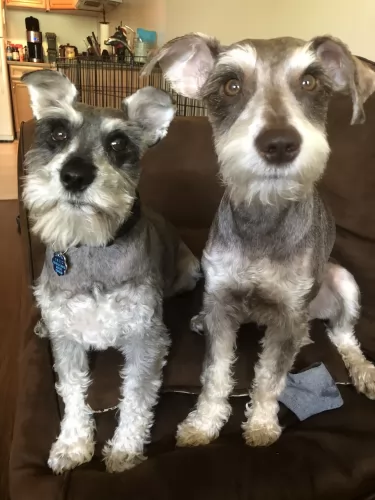 Let’s look at several ways you need to care for your Miniature Schnauzer -
Let’s look at several ways you need to care for your Miniature Schnauzer -
Make sure you have his puppy injections on time. This means knowing which veterinarian you’ll use. Later on if you don’t want to go in for breeding, you will need to have your pet spayed or neutered.
Make sure you have a nice warm, dry spot for your dog to sleep. It can be a cardboard box, or you can buy a dog basket or sleeping platform. Make sure your pet loves it and knows he can retreat to it anytime he wants.
If he goes outside for a few hours, make sure that he has a place to lie in the shade and away from the elements.
Good food promotes good health and longevity. You can feed your pet one of the top quality commercially manufactured foods and give your pet some variety by adding in some boiled chicken, vegetables and brown rice. Some raw meat occasionally can also be excellent for your pet.
 The Smithfield has plenty of energy and loves nothing more than lots of games with the children. He will also look forward to a walk every day as well as other activities.
The Smithfield has plenty of energy and loves nothing more than lots of games with the children. He will also look forward to a walk every day as well as other activities.
When it comes to grooming, you can save money by grooming your dog at home. Whether you have your pet’s hair cut or you leave it as is, get into the habit of brushing the fur at least twice a week. You can speak to your vet or groomer and get advice on what comb of brush to use on your Smithfield.
It you want to cut your pet’s hair, it is important to use the right equipment so you don't accidentally injure him. Certainly if you feel unsure about shaving your dog at home, leave this grooming aspect to the experts.
Check your pet’s eyes. They must be clear and bright. Check inside his mouth for bad teeth. Check inside his ears to make sure they aren’t red with infection.
Your Smithfield is relying on you to provide him with good food. For convenience, it is always a good idea to have a packet of the best dry kibble there is. Check out the label and make sure to buy one that has a good balance of vitamins and minerals.
Give him some tasty homemade food too. Remember to keep it plain and simple. Boiled chicken, brown rice or pasta and spinach, sweet potatoes and carrots are nutritious and tasty. This food can all be chopped up and small portions added to the dry kibble twice a week as a treat.
You’ll never have to worry about digestion problems with your dog. A little bit of raw meat can also go a long way to ensuring his skin stays healthy and free of skin infections. Ensure that he has a constant supply of fresh, cool water.